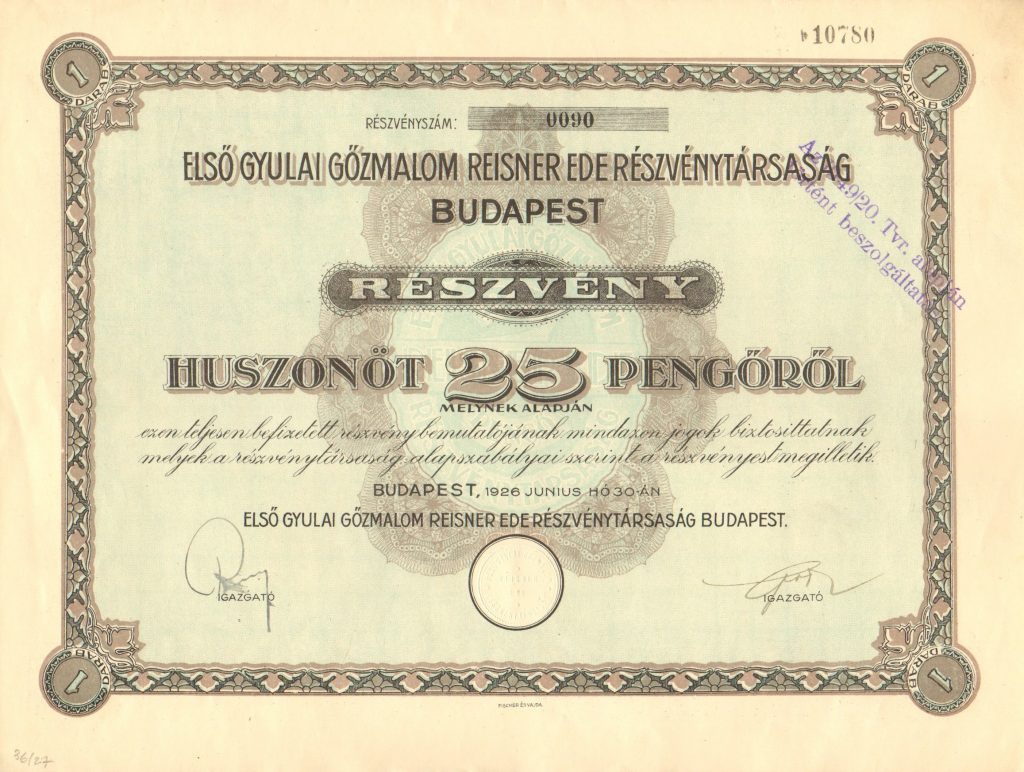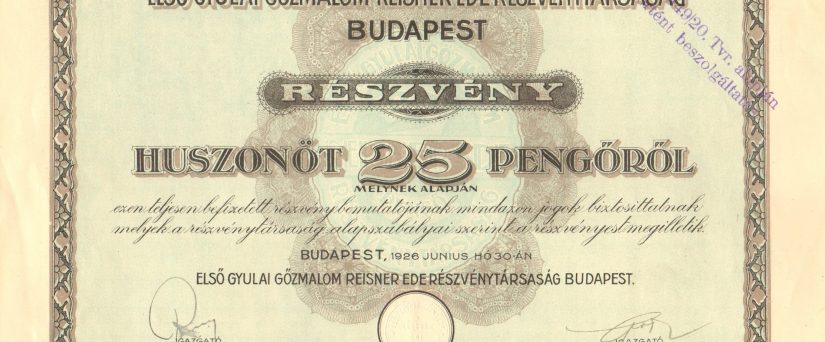First Gyula steam mill Reisner Ede ltd
The First Gyulai Steam Mill Reisner Ede Reisner Joint Stock Company was founded in September 1917, the company's activities were "the acquisition of the company's steam mill in Gyula, the continuation of the mill business, as well as the purchase and sale of grain and other agricultural products, the production, processing and marketing of grist for own account and for the account of third parties". The company was listed on the stock exchange from 1924 to 1926. In 1929, during the Great Depression, the company went into crisis and became indebted, which led to its liquidation in 1935.
History
In the second half of the 1800s, the town of Gyula, located in the south-eastern corner of the Great Plain, had 20,000 inhabitants, and by 1920 it had 25,000. The rapidly growing population and improving grain production made it necessary to establish a steam mill in addition to the windmill and dry mills already operating in the town. Rudolf Geyer obtained a licence to set up the first steam mill in Gyula in November 1866.
In the 1960s, Gyula was also an important trade fair centre, although the transport needed to stimulate trade in the Great Plain was heavily dependent on the weather. The local grain trade also adapted to the road conditions, keeping granaries and transporting the goods purchased in dry weather. Credit arrangements were rudimentary and most goods could only be obtained by advance payment.
Foundation
The Reisner mill originally belonged to the Wenckheim family and was acquired by the Reisners in 1864.
In 1907 the First Gyulai Steam Mill, a limited partnership was established under the name of Zsigmond Reisner "which, in addition to the steam mill business, also engaged in flour selling, bread baking and selling." The company ceased to exist in 1910.
The First Gyulai Steam Mill Reisner Ede Joint Stock Company was founded in September 1917, with its headquarters in Budapest and a share capital of 500 000 crowns. According to the Central Bulletin of the time, the company's activities included "the acquisition of the company's steam mill in Gyula, the operation of the mill business, the purchase and sale of grain and other agricultural products, the production, processing and marketing of grist for its own account and for the account of third parties."
The total annual production of the steam mill was between 800 and 1200 wagons. It also exported to Austria and Czechoslovakia.
The company on the stock exchange
At the end of March 1924, the Stock Exchange Council ordered the registration and listing of the stock exchange.
From mid-May 1925, like many other shares, it is listed on the stock exchange quotation list in pence.
In July 1929, it was reported that the Board of the Stock Exchange had ordered the company to be wound up, as it had done with several other companies. In a relatively lengthy article, the Magyar Hírlap gives a thorough explanation. Some of them were delisted a long time ago, others were so insignificant for the stock exchange that they have not been traded for more than a year.... By this deletion, no one wanted to call into question either the creditworthiness of the companies or their credit standing, but only to rid the stock exchange as a market of a commodity that could only be bought, not sold, and thus only lost."
The company's crisis and then its downfall
In 1929, the First Gyulai Steam Mill Ltd. made a profit of "only" 2912 pence, compared to 3623 pence in the previous year. In 1930 the net profit was only 840 pence. The company had not paid dividends for years.
From the mid-1920s, the 52%-owned Financial Institution Centre had been lending to the mill, but in 1935, during the regular semi-annual audit, they were in the mill for a remarkably long time.
In July 1935, news had been circulating for days that "serious differences had arisen between P.K. and the Reisner family, who run the mill", and that there were problems at one of the busiest mills in South Transdanubia, which "produced 5-6 wagons of flour a day and had been working full-time since the harvest with 200 workers around the clock." At the end of the month, the Reisner mill was seized and its stocks were put under lock and key, which in no time caused enormous tension among the mill workers and the 1,000-1,500 farmers in the area who were interested. Some of them had 40-50 wagons of grain stuck inside.
The seizure was ordered by the Minister of Finance, and the legal basis for it was in place: according to the rules, enforcement could be triggered for as little as one month's tax arrears on flour sales, while Reisner's mill had accumulated more than two months' arrears.
The Financial Centre then initiated an auction and in August 1937 the new owner was the United Hungarian Milling Company, which had been operating the mill for a year. The liquidation of the joint-stock company was completed by the spring of 1939.
After the failure of the mill, Ede Reisner set up Dehydró in 1936 on the land next to the factory, which at first mainly produced milk powder, but later also butter and corn.
Sources
- Molnars Lapja, 24 February 1917.
- World, 23.03.1924.
- Magyar Hírlap, 14 July 1929.
- Esti Kurír, 25 March 1930.
- Molnárok Lapja, 3 August 1935.
- Budapesti Hírlap, 28 July 1935 No 170
- Independence, 28 July 1935.
- Orosházi Fresh News, August 14, 1937.
- Dr. Ferenc Scherer (1938) History of the town of Gyula, volume II The town with a regular council. City of Gyula m.
Founded in 1917
Date of cessation: 1939
Founders: Ede Reisner
Securities issued:
| First Gyula steam mill Reisner Ede ltd |
Decisive leaders:
1917 | István Reisner |
Main activity: milling industry
Seats:
1917 | V. Wurm-u. 3., Budapest |
Locations:
1917 | Reisner mill, Gyula |
Author: by Edit Ternyák

Founded in 1917
Founders: Ede Reisner
Decisive leaders:
1917 | István Reisner |
Main activity: milling industry
Main products are not set
Seats:
1917 | V. Wurm-u. 3., Budapest |
Locations:
1917 | Reisner mill, Gyula |
Main milestones are not set
Author: by Edit Ternyák
First Gyula steam mill Reisner Ede ltd
The First Gyulai Steam Mill Reisner Ede Reisner Joint Stock Company was founded in September 1917, the company's activities were "the acquisition of the company's steam mill in Gyula, the continuation of the mill business, as well as the purchase and sale of grain and other agricultural products, the production, processing and marketing of grist for own account and for the account of third parties". The company was listed on the stock exchange from 1924 to 1926. In 1929, during the Great Depression, the company went into crisis and became indebted, which led to its liquidation in 1935.
History
In the second half of the 1800s, the town of Gyula, located in the south-eastern corner of the Great Plain, had 20,000 inhabitants, and by 1920 it had 25,000. The rapidly growing population and improving grain production made it necessary to establish a steam mill in addition to the windmill and dry mills already operating in the town. Rudolf Geyer obtained a licence to set up the first steam mill in Gyula in November 1866.
In the 1960s, Gyula was also an important trade fair centre, although the transport needed to stimulate trade in the Great Plain was heavily dependent on the weather. The local grain trade also adapted to the road conditions, keeping granaries and transporting the goods purchased in dry weather. Credit arrangements were rudimentary and most goods could only be obtained by advance payment.
Foundation
The Reisner mill originally belonged to the Wenckheim family and was acquired by the Reisners in 1864.
In 1907 the First Gyulai Steam Mill, a limited partnership was established under the name of Zsigmond Reisner "which, in addition to the steam mill business, also engaged in flour selling, bread baking and selling." The company ceased to exist in 1910.
The First Gyulai Steam Mill Reisner Ede Joint Stock Company was founded in September 1917, with its headquarters in Budapest and a share capital of 500 000 crowns. According to the Central Bulletin of the time, the company's activities included "the acquisition of the company's steam mill in Gyula, the operation of the mill business, the purchase and sale of grain and other agricultural products, the production, processing and marketing of grist for its own account and for the account of third parties."
The total annual production of the steam mill was between 800 and 1200 wagons. It also exported to Austria and Czechoslovakia.
The company on the stock exchange
At the end of March 1924, the Stock Exchange Council ordered the registration and listing of the stock exchange.
From mid-May 1925, like many other shares, it is listed on the stock exchange quotation list in pence.
In July 1929, it was reported that the Board of the Stock Exchange had ordered the company to be wound up, as it had done with several other companies. In a relatively lengthy article, the Magyar Hírlap gives a thorough explanation. Some of them were delisted a long time ago, others were so insignificant for the stock exchange that they have not been traded for more than a year.... By this deletion, no one wanted to call into question either the creditworthiness of the companies or their credit standing, but only to rid the stock exchange as a market of a commodity that could only be bought, not sold, and thus only lost."
The company's crisis and then its downfall
In 1929, the First Gyulai Steam Mill Ltd. made a profit of "only" 2912 pence, compared to 3623 pence in the previous year. In 1930 the net profit was only 840 pence. The company had not paid dividends for years.
From the mid-1920s, the 52%-owned Financial Institution Centre had been lending to the mill, but in 1935, during the regular semi-annual audit, they were in the mill for a remarkably long time.
In July 1935, news had been circulating for days that "serious differences had arisen between P.K. and the Reisner family, who run the mill", and that there were problems at one of the busiest mills in South Transdanubia, which "produced 5-6 wagons of flour a day and had been working full-time since the harvest with 200 workers around the clock." At the end of the month, the Reisner mill was seized and its stocks were put under lock and key, which in no time caused enormous tension among the mill workers and the 1,000-1,500 farmers in the area who were interested. Some of them had 40-50 wagons of grain stuck inside.
The seizure was ordered by the Minister of Finance, and the legal basis for it was in place: according to the rules, enforcement could be triggered for as little as one month's tax arrears on flour sales, while Reisner's mill had accumulated more than two months' arrears.
The Financial Centre then initiated an auction and in August 1937 the new owner was the United Hungarian Milling Company, which had been operating the mill for a year. The liquidation of the joint-stock company was completed by the spring of 1939.
After the failure of the mill, Ede Reisner set up Dehydró in 1936 on the land next to the factory, which at first mainly produced milk powder, but later also butter and corn.
Sources
- Molnars Lapja, 24 February 1917.
- World, 23.03.1924.
- Magyar Hírlap, 14 July 1929.
- Esti Kurír, 25 March 1930.
- Molnárok Lapja, 3 August 1935.
- Budapesti Hírlap, 28 July 1935 No 170
- Independence, 28 July 1935.
- Orosházi Fresh News, August 14, 1937.
- Dr. Ferenc Scherer (1938) History of the town of Gyula, volume II The town with a regular council. City of Gyula m.
